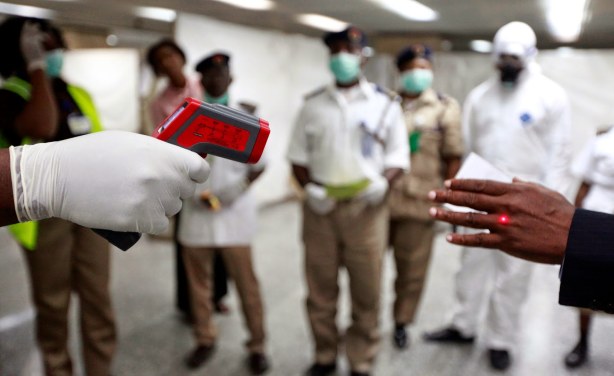
Following the fresh Ebola outbreak in the Democratic Republic of Congo, Nigeria’s premiere port, the Lagos Port Complex (LPC) Apapa has resumed screening of all port users against the spread of the virus.
A Port Health Service official told SHIPS & PORTS DAILY that the screening exercise was mandatory because of the movement of people through the seaport.
He said, “We are all aware of the resurfacing of Ebola virus in DR Congo. It has not come to Nigeria but since we have trans-border movement relationship, we need to take precaution.
“What happens to a country should serve as lessons to other countries in the region. What we are doing is prevention because prevention is better than cure.
“We don’t want it to resurface in our country and that is why the Honourable Minister of Health, Professor Isaac Adewole in conjunction with the Director, Public Health, Dr. Igige and Director Port Health Service in Nigeria, Dr Alex Soko mandated us to go back to the screening exercise in order to avoid any casualty in our port,” the official said.
“We posted our officers to each terminal screening every person coming into the terminal to avoid any unprepared incident and since we have started no record of Ebola has been reported.”
He said so far, no vessel coming into Nigeria is known to have arrived from DR Congo.
Meanwhile DR Congo has reported 42 cases of the Ebola virus disease in the ongoing outbreak, Jessica Ilunga, spokeswoman for the country’s Ministry of Public Health said on Tuesday.
The DRC Ministry of Health publicly declared the beginning of the EVD epidemic on May 8.
The World Health Organisation (WHO) in a press statement on Monday said that April 4 through May 13, a total of 39 Ebola virus disease cases had been reported in DRC, including 19 deaths.
“The latest numbers until May 13, 2018 are: 42 cases, including two confirmed; 21 probable and 19 suspected.
“Majority of the cases are in the health zone of Bikoro; others are reported in the health zones of Iboko and Wangata,” Ilunga said.
The spokeswoman added that all people with confirmed or suspected EVD would be moved to the Ebola treatment centres as soon as the facilities were ready.
Ilunga stated that a key feature of the government’s response to the current Ebola outbreak would be vaccination.
The WHO is expected to send 4,000 doses of Ebola vaccine to DRC in the near future.
This will be the first time that DRC includes vaccination in its national EVD response plan.
The spokeswoman noted that government was trying to prevent the spread of EVD by carrying out screening tests at the airports and other entry points to Mbandaka, capital of the Equateur Province.
The Ebola-hit Bikoro, Iboko, and Wangata health zones are located in the Equateur province.
“In order to prevent the spread of the virus to the neighbouring urban centres, the ministry has set up surveillance checks at all entry points of the city of Mbandaka.
“Now our health agents monitor the temperature of all people travelling to and from Mbandaka by air, sea and land.
“Furthermore, the ministry is working with health authorities in other urban centres near Mbandaka, including Kinshasa and Kisangani, to prepare contingency plans in these cities as well,” Ilunga said.
This is the DRC’s ninth EVD outbreak since the virus was discovered in the country in 1976.